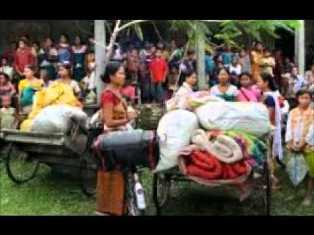
Guwahati, July 26: Assam is on an edge. There have been fresh clashes and cases of arson and more people have died in ethnic violence. Shoot-at-sight orders are in place in four districts. The exodus of people from villages affected by the clashes continues; they are taking shelter at about 120 relief camps set up by the government.
Here are the latest developments:
1. Six more people have died today in clashes between minority Bangladeshi immigrants and Bodos in four districts of lower Assam; 41 people have died in the ethnic strife since Friday, July 20.
2. Entire villages have emptied out after houses were burnt down. Buses, cars and schools were set afire too. In the last four days since clashes began, nearly 2 lakh people have had to flee their homes. Over 10,000 people have reportedly escaped into neighbouring West Bengal.
3. The Army today mobilised about 1000 troops to enforce peace in the areas. "The troops are also carrying out flag marches in these areas," officials said.
4. There has been curfew in the four districts since the weekend. Curfew was relaxed for few hours in Kokrajhar today, but has been reimposed indefinitely. Curfew has also been extended indefinitely in Chirang and Dhubri districts where night curfew had been in place so far.
5. Trains have been targeted and the entire North-East was cut off by rail for two days. Eight Assam-bound trains that were stuck in West Bengal's Jalpaiguri district since yesterday are finally on their way to Dibrugarh as services resumed in the Alipuduar-Kokrajhar section. Special trains will run tomorrow to help stranded passengers; overnight trains will resume from tonight. The Army is helping to ensure that the tracks are clear. Union Home Secretary RK Singh said that 2,000 Central security personnel have been deputed to guard Guwahati-bound trains and railway tracks.
6. The Railways estimate that more than 30,000 train passengers were stranded in different places since Monday. Many of them have made alternative arrangements, some buying expensive air tickets. More than 10,000 passengers are, however, still stranded at stations, grateful for any food they can come by.
7. In Guwahati, Chief Minister Tarun Gogoi held a meeting of government officials, including the chief secretary, to monitor the situation. Assam's police chief, J N Choudhury, visited the violence-hit districts and met top security officers.
8. Union Home Secretary RK Singh, meanwhile, directed the state government to book the ring leaders involved in the violence. "No one involved in the violence will be spared," Mr Singh said in New Delhi today.
9. The situation had been tense since early July when two migrants were killed. Two more were killed on July 19, but police failed to identify the killers. On Friday last (July 20) four former Bodo Liberation Tigers men were killed. The Bodos retaliated by attacking migrants.
10. The BJP today alleged that illegal immigration from Bangladesh was responsible for ethnic and communal discord and asked the government to seal the border with the neighbouring country.





Comments
Add new comment